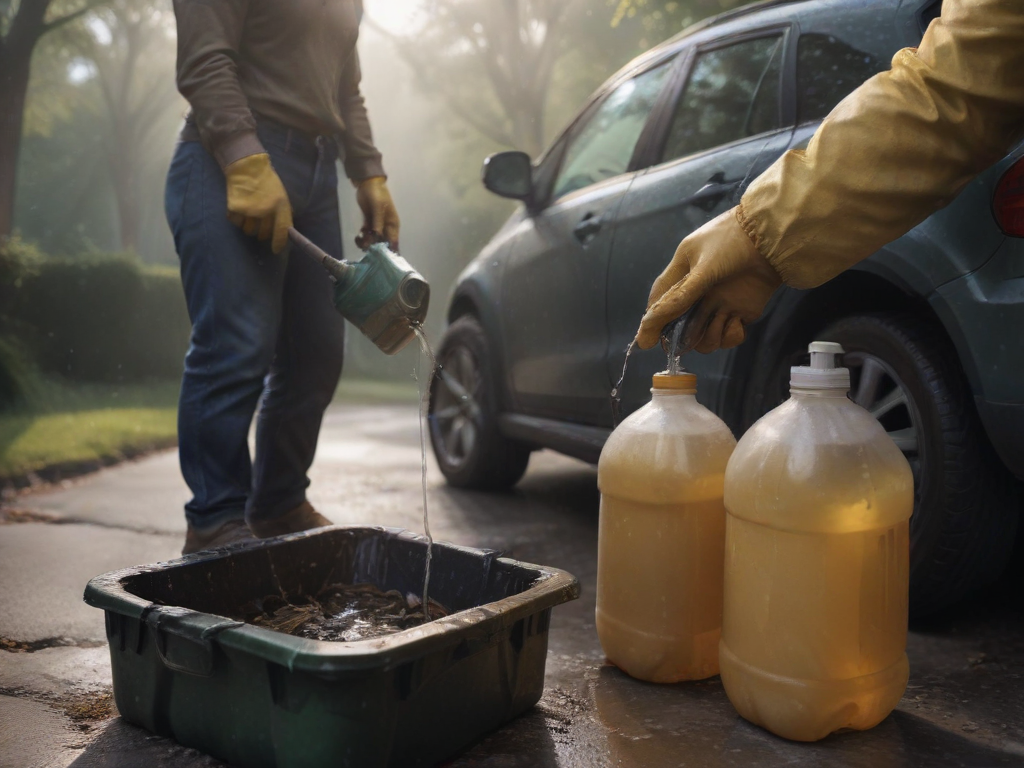
As I was changing the oil in my car last weekend, it struck me how crucial proper fluid disposal is for reducing environmental impact.
The way we handle fluids like oil, coolant, and brake fluid can have far-reaching consequences that we might not even realize. From groundwater contamination to harming wildlife, the risks are significant.
However, there are effective ways to manage and recycle these fluids, ensuring our vehicles operate efficiently while minimizing harm to the environment.
Let’s explore the importance of responsible fluid disposal and how it can make a difference in our ecological footprint.
Importance of Proper Fluid Disposal
Proper fluid disposal plays a crucial role in reducing environmental harm caused by automotive waste. When old or unused fluids like motor oil, transmission fluid, and coolant aren’t disposed of correctly, they can leak into the soil and water sources, leading to pollution and harm to wildlife. It’s essential to handle these fluids responsibly to prevent contamination and protect the environment.
By properly disposing of automotive fluids, we can prevent them from seeping into the ground and potentially reaching rivers, lakes, and oceans. This proactive approach helps safeguard aquatic ecosystems and ensures that our water sources remain clean and safe for both wildlife and human consumption.
Moreover, responsible fluid disposal also contributes to reducing air pollution. When fluids are improperly disposed of and end up in landfills, they can release harmful chemicals into the air during decomposition. By following appropriate disposal methods, we can minimize these emissions and help maintain air quality in our communities. Proper fluid disposal isn’t just a matter of convenience; it’s a critical step in preserving our environment for future generations.
Common Automotive Fluids to Dispose
Among the various automotive fluids that require proper disposal, motor oil stands out as one of the most commonly discarded substances in need of environmentally conscious handling. When it comes to automotive fluids that need careful disposal, here are some common ones to keep in mind:
-
Transmission Fluid: Used in automatic and manual transmissions, it requires proper disposal due to its potential contaminants.
-
Coolant: Contains ethylene glycol, which is toxic and harmful to the environment if not disposed of correctly.
-
Brake Fluid: Must be disposed of properly as it can be corrosive and harmful to the environment.
-
Power Steering Fluid: Contains additives and chemicals that can be harmful if leaked into the environment.
-
Differential Fluid: Used in differentials to reduce friction, it needs proper disposal to prevent environmental damage.
Properly disposing of these common automotive fluids is essential to minimize environmental impact and protect ecosystems from contamination.
Environmental Risks of Incorrect Disposal
Improper disposal of automotive fluids poses significant environmental risks, threatening ecosystems and potentially harming wildlife. When these fluids, such as motor oil, coolant, and brake fluid, aren’t disposed of correctly, they can seep into the soil and contaminate groundwater sources. This contamination not only affects the quality of drinking water but also disrupts aquatic habitats, endangering fish and other wildlife that depend on these ecosystems.
Furthermore, improper disposal methods like pouring fluids down storm drains or onto the ground can lead to pollution of rivers, lakes, and oceans. The toxic components in automotive fluids can accumulate in the environment, causing long-lasting damage to aquatic life and vegetation. Marine animals may ingest these pollutants, leading to bioaccumulation up the food chain and potentially impacting human health if contaminated seafood is consumed.
Best Practices for Fluid Recycling
To minimize environmental harm, responsible disposal of automotive fluids through recycling is crucial. When it comes to fluid recycling, there are several best practices to follow:
-
Find a Certified Recycling Center: Locate a reputable facility that specializes in the recycling of automotive fluids to ensure proper handling.
-
Separate Fluids: Keep different types of fluids separate to prevent contamination, making the recycling process more effective.
-
Use Proper Containers: Store used fluids in leak-proof containers labeled with the type of fluid to avoid spills and facilitate recycling.
-
Follow Guidelines: Adhere to local regulations and guidelines for fluid recycling to ensure compliance with environmental standards.
-
Regular Maintenance: Implement a routine maintenance schedule to prevent fluid leaks and reduce the amount of waste that needs recycling.
Impact of Responsible Fluid Management
Responsible fluid management practices significantly reduce pollution and protect the environment. By properly handling and disposing of fluids from vehicles, we can prevent harmful substances from contaminating soil, water sources, and wildlife habitats. For instance, recycling used motor oil not only conserves a non-renewable resource but also prevents it from seeping into the ground and potentially polluting groundwater. Additionally, recycling coolant fluids helps prevent toxic chemicals from entering ecosystems and harming aquatic life.
| Benefits of Responsible Fluid Management |
|---|
| 1. Reduces pollution |
| 2. Protects the environment |
| 3. Conserves natural resources |
Implementing responsible fluid management practices is crucial for minimizing our ecological footprint and safeguarding the planet for future generations. Proper fluid disposal and recycling play a vital role in creating a cleaner and healthier environment. By choosing to manage fluids responsibly, we can contribute to a more sustainable and eco-friendly world.
Conclusion
In conclusion, remember to recycle your car’s fluids responsibly to reduce its environmental impact.
By properly disposing of common automotive fluids, you can prevent harmful substances from polluting our planet.
Practice proper fluid management to protect the environment for future generations.
Let’s all play our part in preserving our planet’s precious resources!


